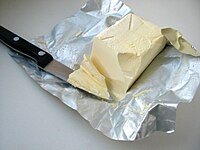
Photo from wikipedia
We propose a J-selective quantitative distortionless enhancement by polarization transfer (J-selective QDEPT) 13C NMR method with enhanced sensitivity for accurate determination of the fatty acid compositions of edible oils. The… Click to show full abstract
We propose a J-selective quantitative distortionless enhancement by polarization transfer (J-selective QDEPT) 13C NMR method with enhanced sensitivity for accurate determination of the fatty acid compositions of edible oils. The J-selective QDEPT protocol is developed by targeted optimization of the known Q-DEPT+ experiment. Based on the one-bond C-H J-coupling constants (1JCH) which can be measured with the heteronuclear two-dimensional J-resolved 13C NMR spectrum, it is possible to optimize the polarization transfer delay Δ and the reading pulse angle ⊖, thus enabling the QDEPT experiment further enhancing 13C resonance signals which have narrow 1JCH ranges over the traditional untargeted Q-DEPT. For edible oil applications, it is demonstrated that this procedure brings a 2.2 enhancement factor against 1.3 of the traditional untargeted Q-DEPT compared to the standard inverse-gated 13C experiment, even with a shorter relaxation delay for the two QDEPT experiments. Another advantage of J-selective QDEPT is that a smaller number of quantitative scans are needed to reach a uniform enhancement for different CHn (n = 1, 2, 3) groups. These features of the J-selective QDEPT are particularly attractive for batch analysis in the food industry.
Journal Title: Food Analytical Methods
Year Published: 2019
Link to full text (if available)
Share on Social Media: Sign Up to like & get
recommendations!